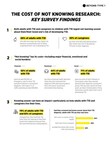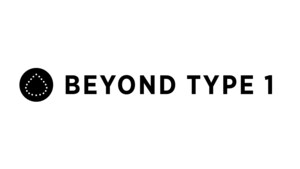Survey findings show 79% of adults with T1D and 83% of caregivers of children under the age of 18 with T1D changed how they lived their life when they first learned of their or their loved one's T1D diagnosis, because they felt overwhelmed and underprepared.
68% of adults with T1D, who did not screen, say they regret not taking an autoantibody test to better understand their risk of developing T1D.
SAN MATEO, Calif., June 5, 2024 /PRNewswire/ -- New survey research from Beyond Type 1, a mission-driven organization helping people with diabetes stay alive and thrive, entitled "The Cost of Not Knowing," quantifies the impacts of a type 1 diabetes (T1D) diagnosis among adults over the age of 18 with T1D and caregivers of children under 18 with T1D – with a focus on their emotional, social, and financial health. Among the most notable takeaways, 68% of adults with T1D who were not screened regret not taking an autoantibody test early to understand their risk of developing the disease. This finding is particularly poignant considering nearly 9 in 10 (88%) required emergency care for T1D symptoms before or during their diagnosis. "The Cost of Not Knowing" was commissioned by Sanofi US.
"Working for an organization on the frontlines of the fight for T1D awareness, we hear constantly from adults with T1D and caregivers about the significant, oftentimes intangible toll of an unexpected diagnosis," said Kristian Hurley, Senior Vice President of Programs, Advocacy, & Health Equity at Beyond Type 1. "The Cost of Not Knowing' pulls back the curtain on these significant impacts and highlights the value of early detection on a person's financial, social, and emotional health."
The Toll of Diagnosis
According to the findings, "not knowing" about the risk of developing T1D has its costs – including major emotional, social, and financial burdens:
- Emotional: 64% of adults with T1D say their emotional health declined when they first received their diagnosis; 61% who experienced feelings such as sadness, fear, anger, or uncertainty at the time of their diagnosis say knowing about their risk sooner would have diminished these feelings.
- Social: Nearly 9 in 10 caregivers (87%) gave up some of their interests or future plans when they learned of their loved one's diagnosis; this is also true for 71% of adults with T1D when they learned of their own diagnosis.
- Financial: Half (50%) of adults with T1D spent at least $5,000 on emergency care for their T1D symptoms before or during their diagnosis, with nearly 1 in 4 (24%) spending at least $10,000.
The Need for "Knowing"
For both adults with T1D and caregivers, early detection has a clear impact, particularly on how they live their life. Notably, 79% of adults with T1D and 83% of caregivers changed how they lived their life when they first learned of their/their loved one's T1D diagnosis because they felt overwhelmed and underprepared. Had they screened and known about their diagnosis sooner, however, 85% of those with T1D say their life may have been different, with more than 1 in 3 (34%) stating they may have felt more in control of their health, 28% stating they may have had more time to prepare, and 20% stating they may have avoided the stress that comes with "not knowing."
Award-winning singer, songwriter, actor, entrepreneur, and philanthropist USHER has first-hand experience with the toll of diagnosis through the eyes of a parent, after his child was diagnosed at age six, and has since been vocal about the importance of early T1D screening. Sanofi engaged USHER as a spokesperson for the 1 Pledge Campaign. He's a spokesperson for "The Cost of Not Knowing" and is also part of a contingent that will be speaking with legislators about the importance of early screening on Capitol Hill.
"As a parent of a child with T1D, I understand deeply that this diagnosis can turn your world upside down in an instant," USHER said. "I wish – as part of my family's journey – we had known about the availability of early screening and the power it gives to prepare for the future; a year, a month, or even a day of advanced notice would have made all the difference. That's why I believe so strongly about the importance of these findings and am passionate about using my voice and platform to encourage people to get screened early for T1D."
Today, over 1.45 million people in the U.S. live with T1D, an autoimmune disease where the immune system attacks insulin-producing cells in the pancreas. T1D can happen to anyone at any age, and ~90% of those diagnosed have no family history. For many individuals and their families, however, a T1D diagnosis comes as a complete shock – with many learning of their condition after experiencing severe symptoms in an emergency setting. While screening for T1D autoantibodies can indicate the risk of developing the condition before symptoms occur, the research confirmed that screening remains an uncommon practice, underscoring the urgency surrounding this new research and the importance of early screening.
Perceived Barriers Preventing Access
Despite the critical importance of early detection, autoantibody screening remains uncommon, largely due to awareness and perceived access barriers. Just consider that only 14% of adults with T1D say they were screened with an autoantibody test prior to their diagnosis – while 72% of those who did not screen were completely unaware that autoantibody screening was available. Of those who were aware, 40% say that their insurance wouldn't cover the cost and 28% say their healthcare provider did not offer it. Even still, 92% of adults with T1D and 96% of caregivers say they would recommend friends and family members get an early autoantibody test for T1D to understand their risk of developing the disease.
Beyond Type 1 and USHER will share more about these findings at a Summit in Washington, D.C. on June 12, hosted by Sanofi.
Key takeaways of "The Cost of Not Knowing" can be found here: https://beyondtype1.org/type-1-diabetes-news.
USHER is a paid spokesperson for Sanofi.
Research Methodology
This research was conducted by Wakefield Research (www.wakefieldresearch.com) via two survey instruments—one among 1,000 US adults with type 1 diabetes and a second among 1,000 US caregivers to children under the age of 18 with type 1 diabetes, between March 15th and March 29th, 2024, using an email invitation and an online survey.
Results of any sample are subject to sampling variation. The magnitude of the variation is measurable and is affected by the number of interviews and the level of the percentages expressing the results. For the interviews conducted in this particular study, the chances are 95 in 100 that a survey result does not vary, plus or minus, by more than 3.1 percentage points from the result that would be obtained if interviews had been conducted with all persons in the universe represented by the sample. The distribution of key demographic characteristics for both audiences, such as gender and age, was monitored during data collection, to align with available information provided by the CDC and NIH.
About Beyond Type 1
Founded in 2015, Beyond Type 1 is a global nonprofit dedicated to the diabetes community. The organization serves the largest digital audience of any diabetes nonprofit with the mission to help people living with diabetes stay alive and thrive. Through peer support programs, global campaigns and digital platforms, Beyond Type 1 is uniting the global diabetes community—across all types of diabetes—and helping to change what it means to live with chronic illness. In 2019, the organization launched its Beyond Type 2 community, dedicated to those living with type 2 diabetes. For more information, visit beyondtype1.org or beyondtype2.org.
About Wakefield Research
Wakefield Research is a leading, independent provider of quantitative, qualitative, and hybrid market research for thought leadership and strategic insights. Wakefield Research is a partner to the world's leading brands and agencies, including 50 of the Fortune 100. We conduct research in nearly 100 countries and our surveys appear regularly in top-tier media. For more information, please visit www.wakefieldresearch.com.
Contact: Oluwatona Campbell, [email protected]
SOURCE Beyond Type 1

WANT YOUR COMPANY'S NEWS FEATURED ON PRNEWSWIRE.COM?
Newsrooms &
Influencers
Digital Media
Outlets
Journalists
Opted In





Share this article